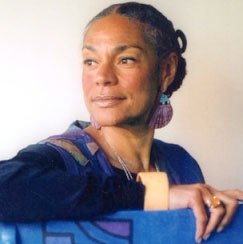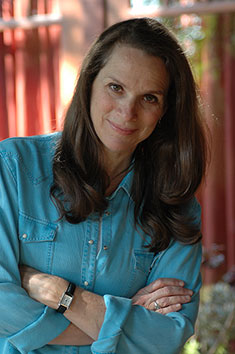
published in the Los Angeles Review of Books
 IN SARA LAWRENCE-LIGHTFOOT'S office at Harvard, the color purple is everywhere. The lavender rug and desk chair and the giant amethyst stone on her desk reveal a flair for the regal and dramatic, a flair taken up by the revered sociology professor herself, who sports long, dangling earrings, giant coral rings on each hand, and a bright, orange silk jacket.
IN SARA LAWRENCE-LIGHTFOOT'S office at Harvard, the color purple is everywhere. The lavender rug and desk chair and the giant amethyst stone on her desk reveal a flair for the regal and dramatic, a flair taken up by the revered sociology professor herself, who sports long, dangling earrings, giant coral rings on each hand, and a bright, orange silk jacket.
The recipient of a MacArthur “Genius Grant” in 1984, Lawrence-Lightfoot has been on the faculty of Harvard’s Graduate School of Education since 1972, and she will be the first African-American woman in Harvard’s history to have an endowed chair in her name — upon her retirement in four years.
Perhaps in anticipation of that moment, her most recent book, Exit: The Endings that Set Us Free, is an elegant examination of how our culture exalts beginnings at the expense of proper goodbyes.
It is a simple but profound idea — that an inadequate exit might leave us feeling bereft and alone. I did some deep thinking on the issue a few months ago when packing up the house in Santa Monica where my husband and I have lived for nearly 30 years. We lovingly built our California Craftsman–style home, and it was there that we raised our three children. Now we were preparing to drive across country and move back to Cambridge, Massachusetts, the place where we first met and fell in love. It seemed like a romantic idea, and freeing too — a new life in the New England foliage, far from the maddening traffic and Botox-loving moms of Los Angeles. This was an adventure I had chosen, but I found myself flooded with self-doubt and almost paralyzed at the prospect of saying goodbye to so many and so much.
Moving on invariably involves loss. Being able to say goodbye “with grace and gratitude,” says Lawrence-Lightfoot, might make it hurt less.
In Exit, Lawrence-Lightfoot reports that, as a culture, we end up saying more than our shares of goodbye. Demographers predict that young adults will have 10 careers, not jobs, in their lifetimes. It is critical that they develop a meaningful language for making exits, Lawrence-Lightfoot writes, because the smaller exits groom us for the bigger ones to come.
In thinking about exits, Lawrence-Lightfoot examines home, freedom, yearning, and grace. She presents portraits of a wide variety of Americans at different crossroads, all of them searching for “the generativity of exit.”
¤
Joy Horowitz: You talk about the need to practice the smaller goodbyes in order to make the larger farewells meaningful. So how do we do that?
Sara Lawrence-Lightfoot: I think we, as a culture, do this poorly. I think there’s a way in which, everyday, we can learn to be attentive to entrances and departures. We can work on our awareness. We can make a habit of noticing those moments that become memorable because of something that happens afterwards or before. Developing respect, a kind of reverence even, for time and space, for coming together and parting — this can be taught in families. It can even be taught in classrooms.
To say goodbye is to live in the existential present. Nothing else can help us in quite the same way prepare for the life-altering exits, the ones that demand a kind of ritualized, deep attention in order for us to use that space as a generative moment to move onto the next moment.
JH: In your book you discuss the paradoxical nature of exiting and how it’s often defined by a sense of push-pull — learning to deal with this push-pull is something psychoanalyst Erik Erickson defines as a stage of developmental progress. As an example you tell the story of a 55-year-old woman who has carefully planned her exit from a nonprofit after 25 years. When she leaves, she is still flooded with regret.
SLL: I think exits are surrounded by a very central conflict that causes enormous ambivalence and sometimes terror and dread in all of us. In order to progress we need to deal with the feelings that pull us backwards even as events push us forward. Resolving this conflict or even recognizing it is a part of exiting well.
This happens of course when we leave a job or say goodbye to a person. But it also happens internally, when an individual is going through some kind of change or development. That’s what Erikson helps us with. He identifies eight major stages of conflict in the life span from birth to death, where, in order to move forward, we have to leave.
There are lots of reasons why exits are hard. Society is so preoccupied with launchings and entrances and moving forward and meeting the next opportunity and tilting toward the future, which take our attention away from departures and leave takings. So we tend to interpret those leave takings as regressions, as failures, as negative spaces in our life journey. We associate the feeling brought on by exits with not doing very well.
JH: I was struck by what you wrote in the book about how the American narrative is so much about the immigrant experience — about leaving one place and arriving in another — as much as it is about new beginnings and opportunity.
SLL: Missing the exit is to miss at least half the story. When my doctoral students come in — they’re 35, they’re smart, they’re focused, they’re critical — they like to begin by telling me what they want to do, what will be their next steps. I always say, “What are you leaving?” That, to me, is a better marker to understand them. And often, when they tell me about the past, they have tears in their eyes. Coming here, it was terribly hard for them to leave their family for whatever they’re doing here.
JH: Could you talk a bit about how you see the difference between a forced exit versus one that is planned?
SLL: It’s harder for people who are forced out. But either way, people have to deal with the same things — the people who remain in the job site, at the workplace, in the institution — they cut off contact with you. The person forced to leave feels isolated, partly because they feel they’ve failed. They’re angry. They’re scared about the future and worried if there is a future or not. There is disassociation, confusion, isolation.
As for people who think of themselves as composing an exit — they imagine a life ahead that doesn’t become their reality. Even if they planned for a time to just sit and veg and dream and play, that’s a hard thing to get through when you’ve been programmed for diligence and purposefulness and institutional connection.
One of the reasons I wanted to write this book is we have to help people learn how to do this in a way that doesn’t feel debilitating. The confusion and disorientation is part of the plan, part of the journey. And we need to be able to tolerate that.
JH: What’s the genesis of the book? Is it an outgrowth of your last book, The Third Chapter, about new learning between 50 and 75?
SLL: Exit came from a feeling I always had in my heart that people didn’t do this saying goodbye very well. My parents, who were highly ritualized in every way with their kids, insisted on certain protocols. You’d leave and you’d have to stand up and shake the person’s hand and look into his eyes. You’d have to say goodbye and be thankful. Summoning grace and gratefulness at that moment — they trained us to do that.
My parents were also very embracing people. Very physical. So exits had a physicality — hugging and cuddling and see you later. My mother was a physician; my father was a professor. They were both social activists and they didn’t have a lot of time together. They would go on postprandial walks (that’s what my father called them). And they would not allow us to come. This was their time alone. This was after dinner. We lived in the country. So they were taking a walk in the country. Even then it was a big deal about saying goodbye. Even at that ordinary moment that was anticipated every single day. It was a leave taking. So I think this must have been embedded in me.
And I know, as a mom, I wanted to do that with my children. I wanted them to know that these moments of exit were as important as their entrances. Everyday I’d look at their backs as they were leaving for school to see whether they’d be strong enough to take on this day, which was sure to be imperfect because every day is. My mother always said her favorite view of her children was of our backs: you need to be strong moving into the world and are you ready?
JH: Your book also discusses the question of how to extricate oneself from a professional relationship. Linda, the psychotherapist, says she thinks of how she’ll terminate with a patient as soon as they meet. And, you point out, sociologists and journalists clamor for access to their subjects without considering how to say goodbye properly.
SLL: Gaining access is so potentially aggressive and intrusive and self-serving. But when the encounter is all over, when you’ve collected your data, what about the exit? What are the ethical and moral responsibilities of the moment? As a student of sociology and anthropology, I’ve had to ask myself, Hey, wait a minute. Why is no one talking about this?
As a doctoral student, I spent a year in Springfield, Massachusetts, in the early 1970s in the classroom of two second-grade teachers. The civil rights movement was at its peak. These were black teachers teaching poor, black kids. I wanted to understand the relationship between their social and political ideologies and the social systems they were trying to sustain inside the classroom.
One day the music teacher didn’t appear, and I was asked to do music with the kids. So we sat in a circle. I taught them some civil rights songs, some Negro spirituals: We Shall Overcome, the soundtrack of our lives at that point. And they loved it, and I loved it. Then I retreated to the shadows of my research position. The day I was leaving I asked the teachers if there was anything I might do in terms of saying goodbye. They said the less we make of it the better. Just say thank you, you enjoyed being there. So I did that, but I felt this was not a good way of saying goodbye. But I was a doctoral student, after all, not calling the shots.
So I left after saying goodbye to other teachers and the principal. As I drove back to Boston, I began crying. I was sad to leave the kids, but I was also crying because I hadn’t left well. And I remember putting on Ray Charles and blasting up the highway. I stopped for gas about halfway back to Boston, and I heard some rustling in the back seat. And there was Ivory, this little gorgeous dark-skinned girl from one of the classes, who had found her way into my unlocked car and kept quiet the whole way. And I said, “What are you doing here?” I was just in shock. And she said, “You didn’t say goodbye.”
I drove Ivory back and took her hand and walked down the steps to her teacher’s house in a working-class neighborhood of Springfield. I asked Ivory, “So how should we say goodbye?” And she said, “We can sing We Shall Overcome.” She was looking for the sense of ritual. Some kind of closure that’s artistic, that’s celebratory, that allows emotion to enter. For me, things become ritual through music. And so Ivory was in my craw as I began this book.
JH: Some people just can’t stand to say goodbye.
SLL: In the act of exiting, it’s much harder to say what you want and be deliberate. People say the only exit that matters is death, but I don’t believe that. These are many opportunities to learn to leave with grace and gratitude. The more we do it, the more likely we’ll have the strength to endure the disorientation and chaos in that liminal space before we figure out the next part of our life journey.
JH: You’ve put enormous pressure on yourself in anticipation of your departure from this institution. It’s like here you are, the authority on exiting beautifully.
SLL: I started teaching when I was 26 years old, and I’ve been at it 40 years, so my professional life has always included much more than Harvard, thankfully. So maybe that will make the departure easier. But I fully expect to feel a sense of great sadness and loss in the midst of this. But I also hope I’m smart enough to compose a way of moving on that is less defined by the institution and more defined by me, so that I’m calling the shots and determining the losses and gains of this experience.
JH: Is your book a way of getting ready to have The Conversation with your children about your final farewell?
SLL: Let’s say I have begun to have that conversation with my children, who are 30 and 28. Like a lot of adults but not fully grown children, they still are, in many ways, financially dependent on me. So, now part of my conversation about retiring in four years from Harvard is, “Heads up, y’all. You’ll have to be in a different place in terms of your independence. Just, please please please please — get ready.” I think I haven’t had the death conversation because I have a mother who is 98 years old. She’s alive and beautiful and functioning. Quite crippled and her mind’s going and all of that. But she’s still behaving like a mother in lots of way. In my last visit, she asked me, “What’s the most compelling thing going on in your life right now?”
I think the story of the oncologist in the book is beautiful — he realizes the way to help his patients exit is to be in deep relationship with them. Not to separate from them. So good exits are about good relationships. You go the distance. You don’t avoid intimacy and connection and advocacy. Most important, you follow the lead of the person in making the exit: what do they want?
JH: You talk a lot about the paradox of exits.
SLL: Parting is such sweet sorrow. It really is. There’s a sadness even before you start eating that delicious thing. Or even before I hear the opening chords of the B-minor Mass, I’m already sad a little bit that it’s going to be over.
We need to recognize and even savor the sad moments that people tend to move through quickly. It takes courage to do it that way.
published in the Los Angeles Review of Books



